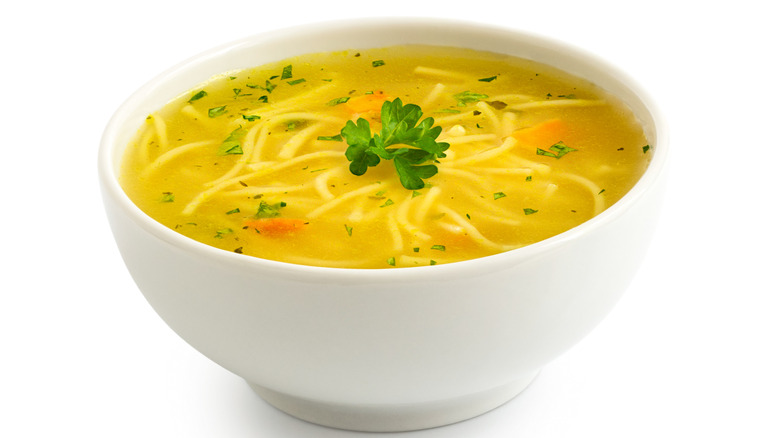Why We Don't Have An Appetite When Sick
When you're stuffed up, zapped of energy, and fighting waves of nausea, the last thing you want to do is eat. Is that because you're simply not hungry or is something happening inside your body causing this loss of appetite?
According to the Canadian Society of Intestinal Research, loss of appetite pertains to a lack of desire to eat — even when hungry. When we're sick, our body works to fight off infection in different ways. One such method is through an inflammatory response, Dr. Donald D. Hensrud, Chair of the Division of Preventive, Occupational, and Aerospace Medicine at the Mayo Clinic tells Huffpost. "As part of this response, we produce chemicals called cytokines, which have a wide range of effects and are partly responsible for the decreased appetite," he says. Crucial for immune function, cytokines can prompt a loss of appetite to redirect the energy that would otherwise be expended on digestion to elsewhere in the body in order to fight illness (via WebMD).
Additionally, hormone fluctuations and a loss of taste and smell may also contribute to a decrease in appetite (via HuffPost). When you're sick and not feeling hungry, it may be tempting to simply surrender to sleep. But it's important to keep fueling your body to give it strength (via CNN). So what should you eat when you're sick and have no appetite?
Try these food items the next time you're feeling sick
According to dietitian Andrea Dunn, beverages such as water, juice, or sports drinks with electrolytes are essential when sick (via Cleveland Clinic). In fact, failing to drink enough fluids when you're sick may be what's contributing to your discomfort. "Oftentimes when we're sick and don't feel well, dehydration is a big part of it," Dunn says.
If you're dealing with a gut-related illness such as diarrhea, try to eat a banana, applesauce, or some crackers, toast, rice, or pasta, all of which can help slow digestion and ease symptoms. Even when you feel nauseous, it helps to eat a small bit at a time. "You should really try to eat every couple of hours," says Dunn (via Cleveland Clinic). If you're experiencing nausea, some safe food options are pretzels, dry cereal, jello, ice cream, frozen fruit, ginger ale, or ginger tea.
Of course, when you're feeling under the weather, it never hurts to turn to the classic favorite: chicken soup. It's tasty, soothing, and will keep you hydrated, plus it's a well-rounded concoction that can benefit the body when sick. "Chicken soup has all the dietary components we want," Dr. Sharon Horesh Bergquist told CNN. "The warm liquid breaks down mucus, which is the first line of defense [of the infection]. Spices in soups can open up sinuses, while salty broth provides electrolytes. And vegetables in soups have antioxidants."


